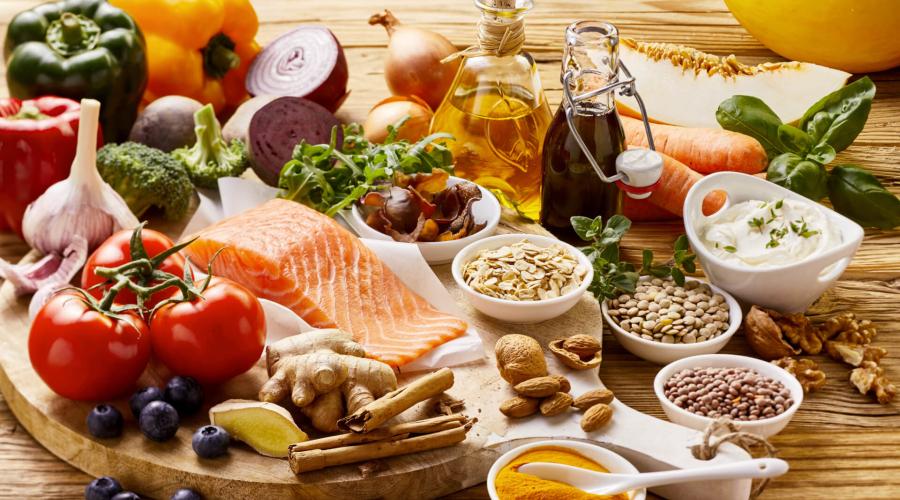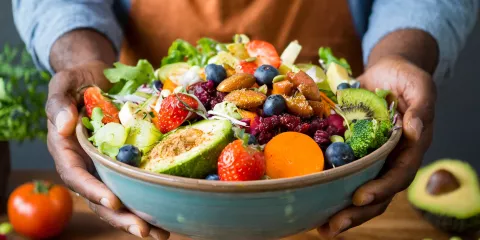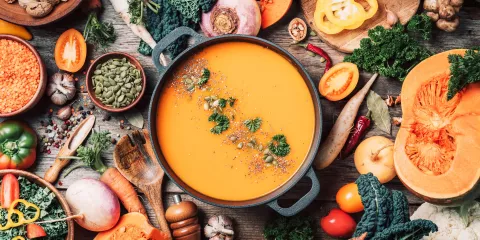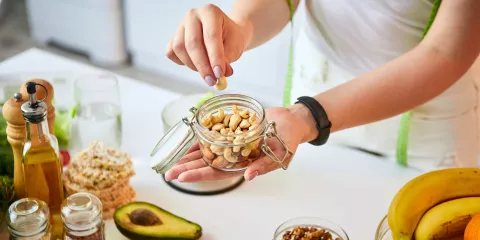
In the age of information, there is so much noise in the health and nutrition space it can be hard to know what advice is actually worth following. Let’s take a look at some of the myths making the rounds to help you wade through the misinformation.
5 Food Myths You Shouldn’t Believe
Myth #1: Fat Makes You Fat
The low-fat and fat-free movement that was the prevailing narrative over the past twenty years has created a fear of fats that is unfounded. Our bodies require a healthy amount of fats to thrive. Does that mean to load up on burgers and fries daily? Absolutely not, but there are many ways to include delicious, healthy fats on a daily basis. Let’s take a closer look at the different types of healthy fats:
- Saturated fat: It is found in animal foods, full-fat dairy, and eggs as well as coconut oil and palm oil. Saturated fats are solid at room temperature.
- Monounsaturated fats (MUFAs): MUFAs are found in a variety of foods, including avocados, nuts and seeds, and oils, such as olive, peanut, sesame, and canola oil. These are liquid at room temperature but will become solid when chilled.
- Polyunsaturated fats (PUFAs): This category includes things like fatty fish, soybean oil, flax seeds, and flax oil, as well as sunflower oil. PUFA oils will be liquid at room temperature and harden when chilled like MUFAs.
A well-rounded diet will include a mixture of all of these types of fats. Healthy fats are critically important. Studies have shown that the Omega-3 fatty acids like those found in fatty fish can help to maintain healthy cholesterol levels and contribute to heart health.1 Healthy fats can improve your mood, support bone health, and contribute to better sleep, to name just a few benefits. But quality and quantity both matter. When looking to include fats, steer clear of trans fats or anything that says “hydrogenated” on the label, opting for cold-pressed, unrefined oils, such as olive oil, whenever possible. And be mindful of quantity. Fat is very nutrient-dense and portions should be limited, especially if weight is a concern. A handful of nuts is a serving, while 2-3 handfuls is likely too many and the calories will add up fast!
Myth #2: Eating Eggs Raises Your Cholesterol
I know, I know. The experts keep changing their minds on this one and you don’t know what to believe. However, research has shown that dietary cholesterol actually has very little effect on blood serum cholesterol levels for most people.2 In fact, only 20% of the cholesterol in our blood is due to the food we consume. The other 80% is produced in our livers.3 Further, most of the cholesterol from food cannot be absorbed by our bodies.4 So the amount of cholesterol we have at any given time is actually being controlled by the liver and gall bladder. The difference between someone with a higher LDL cholesterol level and someone with LDL within the normal range could instead be attributed to genetics and a bio-individual response.5
Eggs are a healthy addition to the diet for most people - and not just the whites! All thirteen of the essential nutrients eggs contain are found in the yolk. Egg yolks are also a great source of choline and B-vitamins and all of the fat-soluble vitamins A, D, E, and K.6 Omelette, anyone?
Myth #3: Eat Less, Exercise More
Have you been told by a provider that you just need to eat less and move more? If you are starving yourself and doing hours of cardio, this is for you. This is dated advice and oversimplifies things to a large degree. In the short term, the calorie deficit created means that your body will use stored energy (or fat) for fuel. However, over time the body’s metabolic rate will decrease and it will become difficult to continue to lose. “Eat less, move more” doesn’t take into account the role insulin plays in energy expenditure. If our diet consists of processed, simple carbs, or we are overweight and overproducing insulin, our fat stores will essentially be “locked up” making it difficult to lose weight.7 This approach is further flawed because all calories are not created equal. Foods differ in nutritional value, are broken down and utilized by the body in different ways, and affect blood sugar to varying degrees.8
Myth #4: A Healthy Diet Doesn’t Require Supplements
But I eat all whole, nutrient-dense real food. I must get all of the nutrients I need, right? Possibly, but you still may require a little more. It is important to remember that everyone’s needs are bio-individual, meaning we all have our own varied nutritional needs. But buyer beware — grabbing an inexpensive multi-vitamin off of the shelf may not address your particular unmet dietary needs. However, targeted supplementation can be beneficial. For example, someone who follows a vegetarian or vegan diet could likely benefit from the addition of a B12 supplement, as the best dietary source for this comes from animal and dairy products.9 Also, someone taking a statin medication could benefit from the addition of a CoQ10 supplement, specifically Ubiquinol, as statins decrease our body's production of this very important compound.
Myth #5: Artificial Sugars Are a Better Alternative to Regular Sugar
When trying to minimize sugar intake, swapping it for artificial sweeteners may not be the answer. While they contain fewer calories, there is more to consider. Artificial sweeteners tend to be much more potent than table sugar which can overstimulate sugar receptors. If you regularly consume artificial sweeteners, you may start to find naturally sweet foods, such as fruit, less enjoyable and opt for the processed option instead. Artificial sweeteners have also been shown to upset the microbiome and are linked to gastrointestinal distress.10 They lead to decreased satiety, or fullness, disturb our glucose homeostasis, and can even lead to weight gain.11 Even the natural ones like stevia and erythritol should be used sparingly. They are still processed and can have many of the same effects as their not-so-natural counterparts. But don’t run for the real stuff either — because we already know that consuming lots of real sugar is a concern. The best idea is to focus on removing added sugars from the diet and enjoy the sweetness that comes from real, whole foods.
When it comes to deciphering the truth about what is best for our health, the best advice is to keep it simple. Eat real, whole, unprocessed foods. Load up on healthy, colorful vegetables, lean meats and healthy fats. Get ample rest and move your body every day.
References
1 Yanai H, Masui Y, Katsuyama H, et al. An Improvement of Cardiovascular Risk Factors by Omega-3 Polyunsaturated Fatty Acids. J Clin Med Res. 2018;10(4):281-289. doi:10.14740/jocmr3362w. Retrieved from: https://www.ncbi.nlm.nih.gov/pmc/articles/PMC5827911/
2 McNamara DJ. Dietary cholesterol, heart disease risk and cognitive dissonance. Proc Nutr Soc. 2014 May;73(2):161-6. doi: 10.1017/S0029665113003844. Epub 2014 Jan 9. PMID: 24406106; https://pubmed.ncbi.nlm.nih.gov/24406106/ .
3 https://www.health.harvard.edu/heart-health/how-its-made-cholesterol-production-in-your-body
4 Cohn, J. S., Kamili, A., Wat, E., Chung, R. W., & Tandy, S. (2010). Dietary phospholipids and intestinal cholesterol absorption. Nutrients, 2(2), 116–127. https://doi.org/10.3390/nu2020116
5 Samantha Berger, Gowri Raman, Rohini Vishwanathan, Paul F Jacques, Elizabeth J Johnson, Dietary cholesterol and cardiovascular disease: a systematic review and meta-analysis, The American Journal of Clinical Nutrition, Volume 102, Issue 2, August 2015, Pages 276–294, https://doi.org/10.3945/ajcn.114.100305
6 Réhault-Godbert, S., Guyot, N., & Nys, Y. (2019). The Golden Egg: Nutritional Value, Bioactivities, and Emerging Benefits for Human Health. Nutrients, 11(3), 684. https://doi.org/10.3390/nu11030684
7 McLaughlin T, Abbasi F, Kim HS, Lamendola C, Schaaf P, Reaven G. Relationship between insulin resistance, weight loss, and coronary heart disease risk in healthy, obese women. Metabolism. 2001 Jul;50(7):795-800. doi: 10.1053/meta.2001.24210. PMID: 11436184.
8 https://www.sciencealert.com/why-aren-t-all-calories-created-equal-a-dietitian-explains
9 https://ods.od.nih.gov/factsheets/VitaminB12-Consumer.
10 Suez, J., Korem, T., Zeevi, D. et al. Artificial sweeteners induce glucose intolerance by altering the gut microbiota. Nature 514, 181–186 (2014). https://doi.org/10.1038/nature13793
11 Pearlman M, Obert J, Casey L. The Association Between Artificial Sweeteners and Obesity. Curr Gastroenterol Rep. 2017 Nov 21;19(12):64. doi: 10.1007/s11894-017-0602-9. PMID: 29159583.












